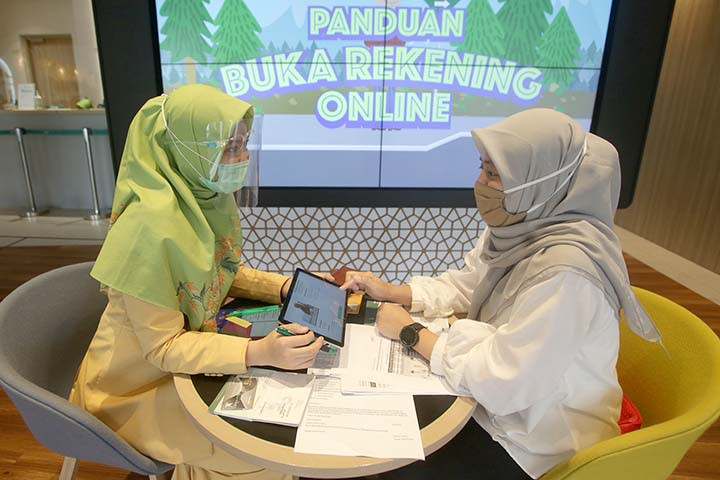Popular Reads
Top Results
Can't find what you're looking for?
View all search resultsPopular Reads
Top Results
Can't find what you're looking for?
View all search resultsTraceable: Stakeholders work to promote digital sharia economy
Indonesia’s sharia financial literacy rate was only 8.93 percent in 2019, Financial Services Authority (OJK) data show.
Change text size
Gift Premium Articles
to Anyone
I
slamic fintech and finance institutions seek to improve Indonesians’ awareness of digital sharia economy and services given untapped potential in the industry.
A recent survey by the Indonesia Waqf Board (BWI) showed that Indonesians only scored 50.4 on waqf (religious endowment) literacy, with the board’s vice chairman, Imam Saptono, saying the lack of understanding resulted in unexplored waqf products.
“This is a problem that we need to solve, which is why we have been trying to increase waqf awareness in schools,” he said during a webinar hosted by the Indonesian Fintech Association (Aftech) as part of Fintech Week on Wednesday.
Indonesia has the largest Muslim population in the world and according to an estimate by the Boston Consulting Group (BCG), the country has 64.5 million middle-class Muslims in Indonesia in 2020. This presents a huge opportunity for sharia finance.
However, Indonesia’s sharia financial literacy rate was only 8.93 percent in 2019, Financial Services Authority (OJK) data show. Moreover, the sharia finance market share was less than 10 percent of Indonesia’s overall financial industry in July.
Imam went on to say that people also still lacked the knowledge for productive waqf options because most Indonesians still preferred to channel their waqf to the “triple M”, namely madrasah (Islamic schools), makam (graveyards) and musala/masjid (praying rooms or mosques) as they could see the assets.
Once people understand the process and the benefit of productive waqf, such as cash-waqf sukuk, he stated, they may be more welcoming to the idea of giving the endowment through digital platforms.
“For example, users can track their money if we adopt blockchain in cash-based waqf. If we can adopt this technology, it will surely accelerate the national waqf ecosystem,” Imam added.
Similarly, National Alms Agency (Baznas) director Moh. Arifin Purwakanta noted that the agency and other Islamic financial service providers should educate more people about the ease of sharia transactions through digital platforms such as e-commerce and crowdfunding websites.
Having an omnichannel presence has helped Baznas to collect donations from the younger generation, with the agency seeing 24 percent of alms paid through online platforms this year. The new cohort of donators, he added, gave smaller sums of money but donated more often.
“We must utilize digital platforms to keep developing the sharia economy. Digitalization is also needed in social finances so we can better our alms inclusion, especially amid the pandemic,” he stressed.
A 2018 Islamic Fintech report by research firm DinarStandard noted that there were 93 Islamic fintech start-ups globally, 31 of which are from Indonesia. The country also saw 14 investment deals in Islamic finance, the highest number among countries in the study.
“The lack of financial literacy is still one of the biggest issues the fintech industry must face. But events such as Fintech Week can help boost people’s awareness,” Indonesian Sharia Fintech Association (AFSI) chairman Ronald Wijaya said on Wednesday.
OJK digital financial innovation and micro-finance development head Triyono Gani said the sharia economy industry needed to explore more products and services to better accommodate customers.
“The biggest challenge for sharia fintech is to find new products and services as I believe they still have many big unexplored potentials,” he said during the webinar.
Read also: Sharia economy to become ‘new wave’ of Indonesia’s economy: VP
A report by DinarStandard, called the State of Global Islamic Economy Report 2020, estimated that Indonesia’s Islamic financial assets were worth US$99.2 billion last year, a 15 percent increase from $86 billion in 2018.
“This past year, the digitalization of Islamic financial products and services has been showing tremendous growth. While the pandemic boosted digital adoption because of physical distancing measures, it is a trend that is set to continue,” the report reads.
Vice President Ma’ruf Amin said during his keynote speech at the event that with such a large potential for economic development, fintech should support Islamic microfinance institutions to help SMEs during the pandemic.
“Fintech can encourage the creation of new sharia businesses and, on a broader scale, help encourage them to become part of the global halal industry chain,” he said. “I am glad because this need has been addressed well by fintech players.”
Read also: LinkAja launches Indonesia's first sharia e-wallet, backed by 1,000 mosques










